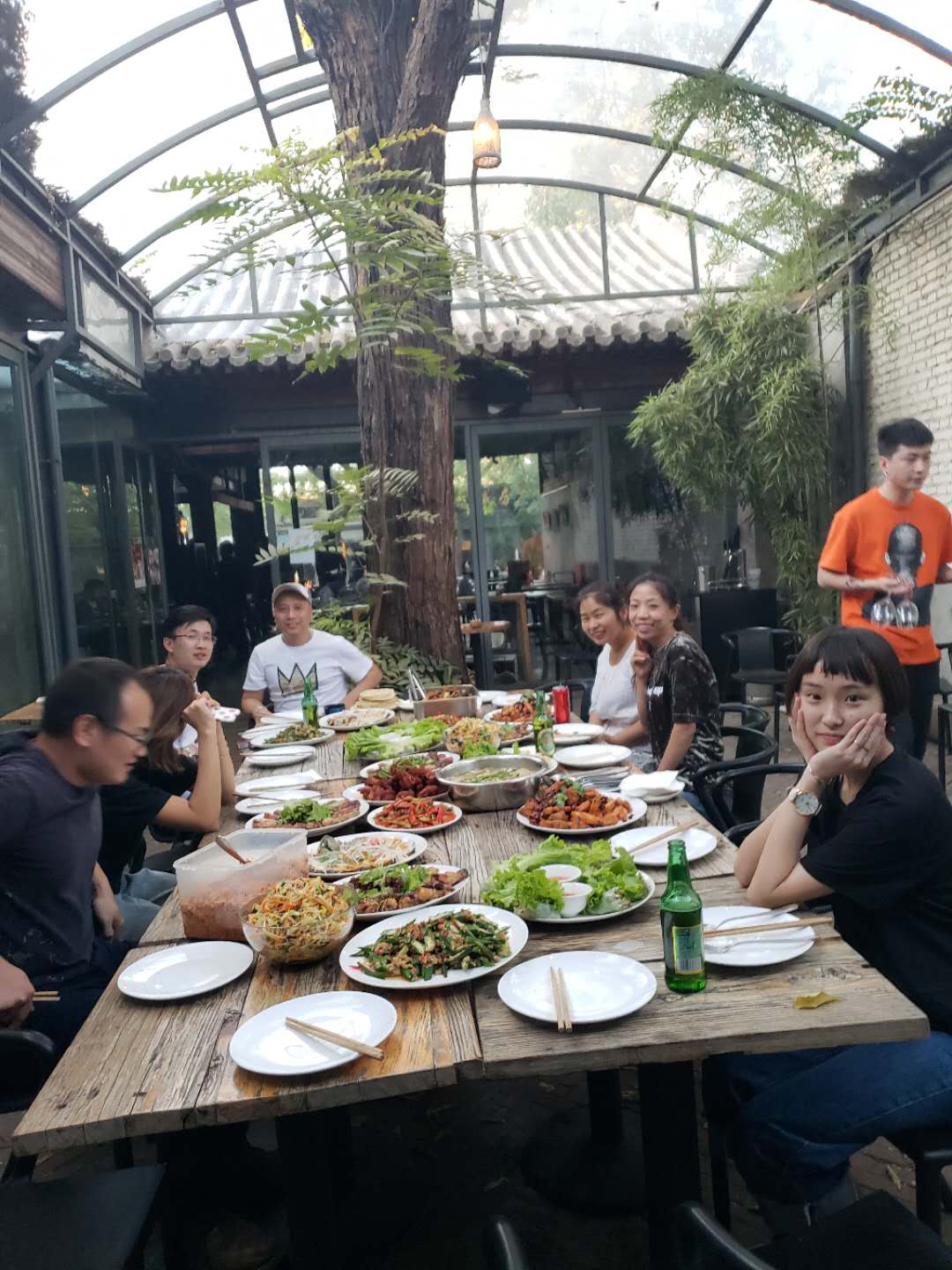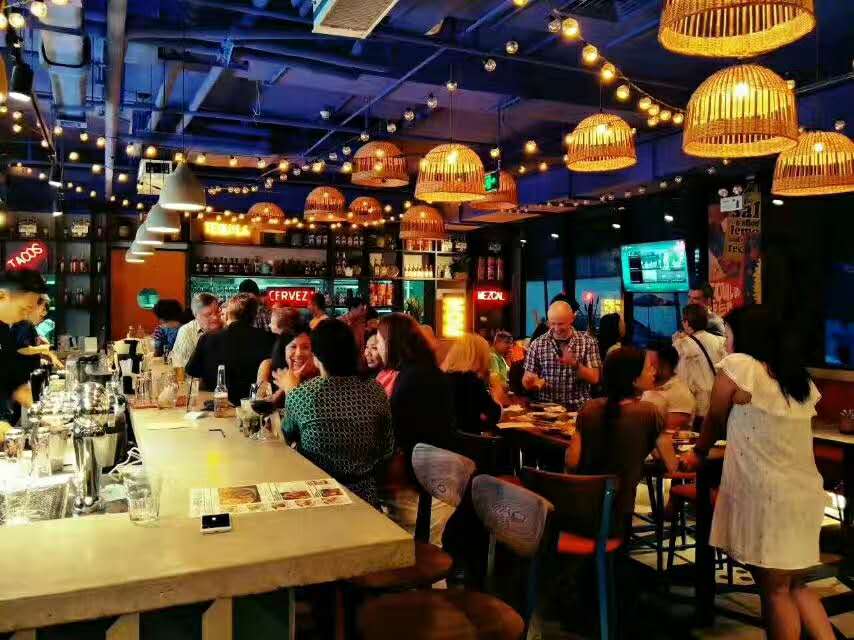At the best of times, running a business is an uphill battle: a struggle to innovate ideas that put you ahead of the competition and turn a profit. In a post-COVID-19 world, however, those challenges have not only grown in scale but morphed into something unrecognizable. In this series, we talk to expat-entrepreneurs and find out what they’re doing to remain both successful in business, and happy at home.
We talked to Seda Sakaoglu, General Manager of Café Zarah in Gulou, and her husband Deniz Sakaoglu, Co-Owner of Q Mex about their COVID-19 experiences as business owners in the capital.

Seda Sakaoglu with her husband, Deniz Sakaoglu
How long have your businesses been in operation?
Zarah first opened in 2007 as a small coffee place. In 2014 after renovation it became the Zarah that you know today with an outdoor courtyard and second floor.
How long have you and your family been in China and what made you decide to move this far East?
I came to China exactly 10 years ago in April 2010. Deniz, my now husband came to China six months before me in 2009. So I would say that a combination of career ambition and romance made me move to China.
I had just finished my International Marketing studies when the economic crisis hit Europe in 2009. It was difficult to find a job in Germany during that time. So, I decided to fly to China to gain some work experience first and started a six-month Management Traineeship at the Commune by the Great Wall Hotel in Badaling and then kept extending my stay every year. That’s how I have spent one-third of my life in Beijing without realizing it. Of course, the fact that Deniz was also somewhere in China played an important role in my decision and made me choose Beijing over Istanbul for example where I already had a job offer which I turned down. Anyway, our paths cross passed again, and we got married seven years later!

“A combination of career ambition and romance made me move to China”
What were you and your family’s initial reactions when COVID-19 first hit the news?
We started to get worried when the Wuhan lockdown was announced, followed by airlines canceling their flights and so forth. I remember there was one morning we were still in bed when we read the news that Germany was sending a plane to fly out its citizens from Wuhan followed by messages from the German Embassy advising German citizens to leave China, in the face of the increasing restrictions in movement. That morning we realized that we had to make a decision before it was too late: to either leave China as the situation and the involved restrictions were increasing; or stay here regardless of what happens. We chose the second option because neither of us was ready to leave their team and business behind which we had created with a lot of effort and love over the years. And also because China is home to us! Instead, we decided to stay here, and face all difficulties together with our teams and make a lot of hard decisions to find ways to ensure our businesses and teams would survive the crisis.
What were your expectations as far as the virus and its effect on daily life and business?
I had expected there to be special measures and new regulations to control the spread of the epidemic such as temperature checks and the mandatory use of masks in public areas. I also expected that some airlines would cancel their routes to and from Beijing and a few countries might close their borders.
Fort Zarah, I had the feeling that we might be closed for a couple of weeks, and that even after the re-opening we might face a lot of restrictions since we are located in the old hood of Beijing which is usually more sensitive than other areas. But I thought that things might go back to normal by April and that’s it!

“I had the feeling that we might be closed for a couple of weeks”
What has been the reality for you and your family during the virus?
The situation was unfortunately more serious and worse than I initially thought. Most of my friends had left China, our families back home were constantly calling us because they were very worried about our health as well as our financial situation.
Zarah was closed for over two months, much longer than I had expected. That was a very depressing period. I was at home and did not know, when, whether, and how we would re-open, what would happen to our team, and whether everyone was safe. We would have regular WeChat calls with our team and also discussions with the owners of Zarah to evaluate the situation weekly. But since the circumstances were still unstable and the outbreak not under control yet, we told our employees to stay in their hometowns where most of them spent CNY.
Another big problem was that everything we needed to re-open Zarah, to protect ourselves as a family at home and to run Q Mex which has never closed during the outbreak, was sold out: no masks, no hand sanitizers, no thermometer, no disinfectant cleaning supplies!
Luckily, we had some masks and sanitizers shipped by our families and friends from Germany and Cambodia to get us at least past the peak of the virus.
Q Mex was also hit heavily like all other restaurants in Beijing, sales collapsed by 80%. Deniz was more worried than me since Q Mex had many more employees to feed and overall fixed costs to cover. So, on the other side, during those two months, when Zarah was closed I could at least support him and my family because I had the time and I was at home.

“Q Mex had many more employees to feed and overall fixed costs to cover”
How has your business been affected by the current situation?
We re-opened Zarah on April 1st and are operating on limited opening hours from 11am – 10pm. All Zarah events including our popular Sunday Brunch buffets are canceled until further notice. We are not allowed to host any events involving big groups which include customer events. This is a big loss for Zarah since a big percentage of our revenue comes from events. Therefore, unfortunately, the whole Zarah team including our management is facing salary cuts to help Zarah survive this crisis.
Q Mex has similar issues and is only allowed to run at limited capacity with restrictions on guest numbers. For each location, the rules are different and constantly changing which is very confusing.
What form of support have you received from the expat community?
We have appreciated the Wechat group Safe & Sane which fed us with valuable and reliable information during the peak of the virus until now.
Also, when Zarah was closed I received a lot of beautiful, motivating messages from customers including expats who were checking on us, and promising their support once we were back open!
Do you believe the current situation will permanently change the face of business in Beijing?
Yes, definitely! For example, even after the outbreak, I believe that hygiene and sanitation will still play an important role for customers and the Government like never before which will force Beijing businesses to maintain high hygiene standards. This will lead inevitably to an upgrade of the Beijing F&B scene in terms of quality, service, training and so forth.
In the long run, I think there will be even bigger changes such as in customers’ habits and perceptions caused by the re-discovery of the preciousness of our health. I believe that this will influence the food choices in the future leading to more health-conscious and mindful consumerism.
As the city returns to business as normal, what are some of the plans you have set in place for your business?
Well, that is difficult for Zarah! Maybe to save all the masks, hand sanitizers and disinfectant cleaning supplies we can get until the next epidemic outbreak hits us? I joke of course, but more to the point, I think bigger groups should take into consideration running their businesses with cash reserves of up to 3 months’ operating expenses. Of course, that slows down a company’s growth, which seems to be the top priority for many F&B groups in our times but on the other hand, it can save a company during this kind of unexpected revenue collapse.
What has been your biggest takeaway from this period of uncertainty?
Patience, calmness, and a positive attitude which also gives hope and strength to your team. If you are strong, hopeful, and positive, your team will follow and go through this situation together with you. So, your attitude is the key and will reflect upon your team!

“A positive attitude also gives hope and strength to your team!”
As a parent and partner, what have you learned from or about your family that will help shape your family life in the future?
“Together we are strong!”
I have learned the importance of emotional support which I received and gave back to my family that helped me to be strong and go through the crisis.
Has the current situation deterred you from Beijing or are you here to stay?
Of course not – I am here to stay!
What advice would you give to other business owners in Beijing at this time?
We have survived the worst part and better days are going to come soon. So, my advice is trying to stay calm and patient which probably sounds sarcastic to businesses that don’t have the time to be patient anymore, because they are on the brink of bankruptcy. Businesses can for example check whether they are entitled to get a loan with reduced lending rates which are currently being offered by many Chinese banks to support coronavirus-hit businesses in Beijing.
How can other expat families show their support for expat business owners in Beijing?
Showing support by frequenting our businesses, by respecting the COVID-19-related regulations which we have to implement, by being nice to our staff, by being more understanding instead of angry, in instances when we cannot serve certain items from our menus or cannot seat you due to limited capacity for example. Stay safe and kind!
KEEP READING: How the Third Culture Kids Stuck Abroad are Coping
Images courtesy of Seda Sakaoglu




